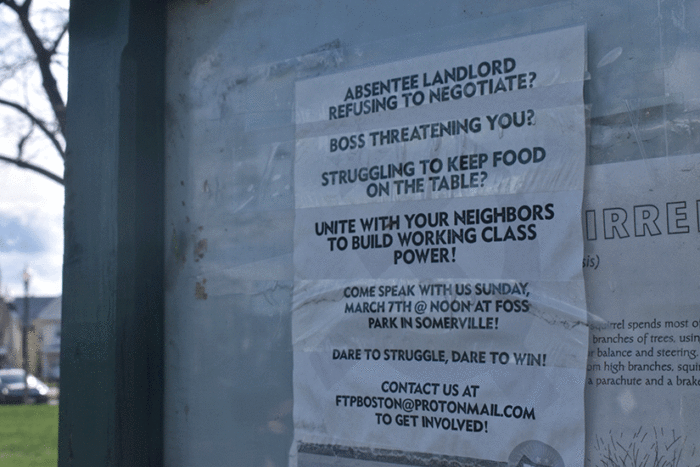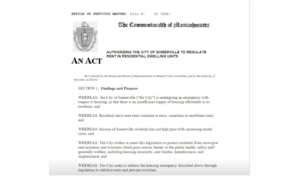There’s a multilateral effort to keep people housed in the city. What’s working? Who’s behind it? And what are they up against?
(Somerville Wire) – The candidate
Anxiety. Depression. Isolation. And a deep sense of defeat. Willie Burnley Jr. remembers feeling all of this worrying about trying to afford to live in Somerville.
According to a study conducted by LDS Consulting Group of Newton, Somerville is home to a large number of residents who struggle to afford rent. The same study concludes that Somerville housing costs have steadily increased throughout the last decade, driven by rising property values, gentrification, and landlords increasing rent.
Burnley remembers feeling proud when he signed his first lease. It was for a top-floor apartment across the street from Foss Park, near Mystic Ave. He’d just moved to Somerville after living in Allston and felt like he was doing everything to make the most of his life. In 2016, Burnley earned his bachelor’s degree and became the first person in his family to graduate from college. He moved to Somerville a year later, where he worked as a freelance writer.
Despite some opportunities, the pay was inconsistent, and the bills quickly started to accumulate. Burnley soon found himself in a relentless struggle to have enough money to pay rent and utilities. He could only afford to pay two-thirds of the costs during some months while his roommate covered the remaining amount.
“I was really struggling,” Burnley said, “which had a lot of shame attached and a lot of guilt.”
He managed to temporarily improve his financial prospects by getting more articles published. “I was paying my bills in full,” Burnley said. “I started to really get on my feet financially.” But then the company he had been writing for shut down the department providing him gigs. Burnley suddenly found himself without his main source of income, and had no severance pay since he was a freelancer.
With no savings or consistent income, he already felt like he was out of options. And then the axe dropped; in the same week he lost his gig, he learned that his rent was to increase by several hundred dollars per month.
“It was … drastic … probably a 50% increase in my rent,” Burnley said. “Even if I was doing well at the time, I don’t know if I would have been able to sustain that increase.”
Burnley recalls how isolating it was to keep receiving bills he knew he could not afford. This forced him to do what many Somerville residents have done: leave the city in search of more affordable housing options. In Burnley’s case, he not only left Somerville, but wound up leaving Massachusetts entirely to return home to California.
That was in 2017. Feeling like a failure, Burnley was terrified that if he didn’t leave Somerville, he could end up homeless.
“I was taught to go to school, go to college, get a job, and pay your bills,” Burnley said. “I thought I failed a very fundamental part of that, which is being able to sustain myself.”
Back in California, Burnley got a job as a seasonal employee at a bakery. He remembers taking long shifts, sometimes 13 hours, and working alongside former inmates and immigrants while preparing hundreds of meals. The hard work eventually paid off, and he saved enough money to return to Mass—first to lower Allston before finally returning to Somerville in 2019.
Today, Burnley is running for Somerville city councilor at-large as one of seven candidates in the Democratic Socialists of America slate hoping to capture a majority of the council seats this fall. A focal point of his platform is addressing the issue of affordable housing.
“My campaign is all about affordability, accessibility, and accountability,” Burnley said. “Rent burdens are high. This means that for most people, they’re giving up huge percentages of their wealth and income every single month.”
The authority
Somerville Public Schools reports that at least 42% of Somerville students are “economically disadvantaged,” while 37% of Somerville families are “severely rent-burdened.” This means that thousands of families are dangerously close to being forced out of the city due to rising housing costs.
Many residents turn to agencies such as the Somerville Housing Authority for affordable options. The agency offers subsidized housing across Somerville for those who are income-eligible.
Income requirements vary across different affordable housing programs, with one common qualification tool being the area median income. There are four main AMI categories that range from moderate-income to extremely low-income.
Somerville is home to nearly 2,000 low-income apartments with rental assistance. Of that total, the Somerville Housing Authority oversees nearly 1,500 affordable housing units across the city. These are households where occupants typically pay no more than 30% of their income towards rent.
Somerville City Councilor Ben Ewen-Campen, an incumbent DSA politician running unopposed in Ward 3, said the city’s affordable housing waitlist is so long that it is estimated to take at least three decades to get housing for every applicant.
Beyond vouchers, Somerville has tried to provide greater protection to vulnerable renters via a series of zoning laws designed to expand affordable housing throughout the city. One policy requires that at least 20% of large residential developments be allocated for affordable housing.
The city also passed the Housing Stability Notification Act in December 2019. The law requires landlords to make renters aware of their rights as tenants. An example is ensuring that renters know only a judge can evict them, not a landlord.
The Somerville City Council updated the city’s existing Condominium Conversion Ordinance to increase tenant protections. The new changes require any owner who wishes to convert their rental unit into a condominium to provide tenants with sufficient notice, submit an application to the Condominium Review Board, and wait to be approved.
The revised Condominium Conversion Ordinance was resisted by several property owners before it was successfully enacted. Hannah Carrillo, the sustainable neighborhoods initiative program coordinator for the City of Somerville, sees the legislation as a victory for improving tenant protections from the overreach of landlords.
“Condo conversion tenants are receiving proper notice ahead of time,” Carrillo said. Now, she added, “They are understanding their rights and they’re being told what they need so they can make decisions that work for them.”
The trust
Carrillo is directly involved in affordable housing through her efforts to develop a Housing Land Trust for Somerville. The trust purchases buildings throughout Somerville to create more affordable housing opportunities. The Land Trust Working Group was established in 2018, with Carrillo playing a key role in shaping the budding idea. It is now a 501(c)(3) nonprofit organization.
“Relationships with the municipalities really go a long way for a community land trust,” Carrillo said. “So the city is doing everything it can to support the land trust, which includes allowing me to spend a significant amount of my time working on it.”
Somerville officials also hope to introduce a real estate transfer fee of 1% that would be placed on all commercial and residential real estate transactions, and that would apply to both the seller and buyer. The money generated from this would then be used to provide additional funding for affordable housing.
Carrillo’s also actively involved in developing the policy recommendations for the real estate transfer charge. “It would be free from specific state regulations,” she said. “This would be municipal money funds that are generated by the municipality and then used by the municipality how we see fit. So we think it’s really critical.”
Ellen Shachter, the director of the Somerville office of housing stability, is working to move this legislation forward too. The Office of Housing Stability was established in 2018.
There is opposition to the real estate tax from the Small Property Owners Association and Realtor Board. They fear that any fees will harm future transactions. Shachter said the fees that are part of this pending legislation cost less than realtors’ fees.
Despite having some confidence in the benefits a new real estate tax could bring, Somerville needs a green light from the state legislature to advance any such proposal.
“We need permission from the entire state,” Shachter said. “Even though only about four or five of the legislators at the State House represent our district, the whole state gets to decide what we get to do. This has been very difficult and problematic for the assessment of tenant rights in the state of Massachusetts.”
Currently, Concord, Brookline, Boston, Truro, and Nantucket have pending legislation to introduce real estate transfer fees.
“All jurisdictions within the state are having problems with housing affordability,” Shachter added, “but in different ways at different levels.”
Shachter worked for nearly 30 years as a senior attorney at Cambridge and Somerville Legal Services representing low-income clients. She now leads the citywide effort to make housing more affordable with a focus on homelessness prevention.
Shachter said the legislative work required to address housing needs in Somerville is more difficult to achieve because the state constitution gives limited authority to municipal governments.
“In some states, a city can decide that it wants to enact rent control and enact it,” she said. “That is not the case in Massachusetts.”
One approach to bypass this restriction is to apply for a home-rule petition. This is when a city asks the state legislature for permission to pass a certain law. Somerville has filed several such petitions related to affordable housing.
Another priority for Shachter is to continue advocating for right-to-counsel legislation, which would give tenants facing eviction the same right to an attorney for free or partial cost as somebody might have in a criminal case.
“There might be probation, community service, or a fine, and if nothing further happens, your record goes away in a criminal case,” Shachter said. “With an eviction, you have a permanent case on your record.”
Shachter believes another important step in resolving housing instability is to ensure that tenants have equal access to attorneys. This, she said, could begin to level the playing field.
“About 90% of landlords are represented and about 10% of tenants are represented,” Shachter said. “So that disparity is even greater in Somerville than it is throughout the state.”
The response
Somerville has responded to the effects of the COVID-19 pandemic in a variety of ways. The city has distributed more than $2 million for rental assistance, food, and other needs, and prioritized eviction prevention by providing legal assistance to tenants in housing court, negotiating with landlords, and utilizing federal aid to launch a rent-relief program.
Somerville first passed its eviction moratorium in March of last year to prevent struggling renters from being put on the streets at the height of the pandemic. While the measure doesn’t stop evictions from being filed in court, it does temporarily prevent landlords from carrying them out. This was done to counter the planned expiration of the statewide eviction moratorium last October.
Meanwhile, the federal eviction moratorium expired at the end of June, causing widespread concern that thousands of Mass renters will lose housing. Also last month, to coincide with that expiration, Somerville Mayor Joe Curtatone submitted a request to extend Somerville’s residential eviction moratorium for an additional 90 days. The request has been approved by the Board of Health, meaning the moratorium will be active until September 15.
Since Mass Gov. Charlie Baker declined to extend the state’s eviction moratorium, landlords have filed nearly 20,000 evictions over the past eight months. Around 3,000 have been completed.
“Levying an execution” prohibits a landlord from removing the tenant’s belongings from the rental property. Even if a landlord begins the legal eviction process and a court decides to evict, tenants cannot be physically removed from their home while the eviction moratorium is active.
Across the state, the Baker administration has increased rental aid. The governor has also encouraged housing courts to forgo eviction in favor of mediation. The data seems to be reflecting this shift—the total number of new cases for nonpayment of rent are about 40% lower than the same period last year. Since then, the pandemic has caused hundreds of thousands of people, including many working-class renters, to lose their jobs.
Planning ahead, in its $2.655 billion Fiscal Year 2022 Capital Plan, the Baker administration proposed huge infrastructure investments, with a strong emphasis on housing. State lawmakers also voted to extend requirements for landlords to provide renters a notice to quit for nonpayment, while the provision also protects renters from eviction while their rental relief applications are being processed.
Still, outspoken housing rights advocates including some elected officials like Cambridge-Somerville state Rep. Mike Connolly, a DSA politician serving in the Mass legislature since 2017, want to see more effort put into fixing the housing crisis. In prioritizing these issues on Beacon Hill, the representative has introduced a variety of bills intended to address different elements of the emergency. One such critical piece of legislation is the Tenant Protection Act, which passed as part of an omnibus “Housing For All” package. Connolly said the Tenant Protection Act would restore the option of rent control in Somerville.
“What we’re saying is our goal is to lift this statewide ban that’s been in place for 25 years now and empower the Somerville City Council to bring everyone to the table to craft tenant protections that make sense on the local level,” the state rep said.
Connolly noted that a hearing for the Tenant Protection Act is expected later this year with the Joint Committee on Housing. With the bill being first introduced during the previous session and generating a positive vote by the committee, he said this is a monumental first step towards eventually bringing the bill to fruition.
“No rent control bill has received any kind of positive vote anywhere in Beacon Hill for many decades prior to the progress that we initiated last session,” Connolly added.
Another key part of the legislative package aims to tax large businesses to generate income for a homelessness prevention fund.
“In my view, the common denominator here is money,” Connolly said. “So, part of what we have to be doing on the state level is looking into these giant corporations that are making their home here in Massachusetts and asking them to pay their fair share so that we can address things like homelessness.”
Family homelessness has doubled in Mass over the past decade. Connolly said the state budget is already robust enough to afford to allocate extra funds towards solving housing instability.
“It’s not a billion-dollar problem,” he said. “If you look at our state budget, it is getting close to $50 billion annually. So, when we have an issue like homelessness that has gotten dramatically worse, and you know that if you could deploy a few extra million per year to address that problem, it could solve things like homelessness.
“That’s the kind of approach I’m trying to push on Beacon Hill.”
The community
In addition to the statewide efforts of Connolly and colleagues on Beacon Hill, community outreach is another way to mitigate the long-term effects of housing instability. Somerville has this in abundance.
The city’s Office of Housing Stability has contracted with Cambridge and Somerville Legal Services to provide additional resources to tenants facing eviction or another housing crisis. This is where Lee Erica Palmer, a staff attorney at Cambridge and Somerville Legal Services, comes in. The nonprofit focuses on eviction prevention, with clients who are typically low-income with limited housing options.
“There are many protections and rights that tenants don’t know about,” Palmer said. “It can be extremely helpful to have an attorney who knows the system.”
Palmer noted that tenants who have access to legal representation typically get a much better negotiated deal and are far more likely to remain in their homes. She added that tenants can win extended stays in their homes until they can find more housing options, and that there is also the chance to recover damages from landlords for different reasons, such as sanitary code violations, denying repairs, or interrupting vital utilities like heat or hot water.
Palmer said the rising cost of rent is the number one concern in Somerville. She attributes this to supply and demand; there is simply not enough housing in the Boston metro area to accommodate all the people who want or need to live there.
This means renters are subject to the whims of for-profit property developers and landlords.
“Many landlords can charge what they want,” Palmer said. “Desperate renters pay what they have to in order to find housing.”
Palmer said gentrification is influencing the steep increase in rent pricing. There are multiple gentrification efforts already underway, with western Somerville experiencing the most change. This is impacting the city’s demographics.
“People with more money and higher incomes move in and push out folks who have lower incomes,” Palmer said. “You see more and more families doubling up or tripling up in apartments with significant overcrowding because they can’t afford their own apartment.”
Somerville property owner Jonathan Michaud believes more landlords should invest extra effort into making their rental units comfortable for tenants. Michaud owns a condo near Tufts University and believes that landlords are responsible for providing a clean, safe, and affordable location for their renters.
“Some owners are just in the business of making as many rooms as possible and maximizing rent, and they don’t spend any money on upkeep or fixing things,” Michaud said. “I’m not going to rent out a property to someone and have it be in poor shape.”
Absentee landlords are a problem. Somerville has explored options to address this, including a rental registry designed to increase city inspections of non-owner-occupied properties.
On the other side of things, one reason pushing some landlords to increase rent is the assessed value of property. As values rise, property owners pay higher taxes, even if the tax rate stays the same.
“So every year real estate taxes will go up on your property,” Michaud said. “A lot of these costs will be passed onto renters.”
Somerville does have relatively low residential real estate taxes per square foot. However, this is overshadowed by the price of the assessed values of properties, which keep climbing. Michaud said he takes the current rental market, property expenses, and utility costs into account when deciding how much rent he should charge his tenants.
The control
Massachusetts law is favorable to tenants, meaning it is typically difficult for landlords to evict for failure to pay rent. Michaud has never evicted anyone before and prefers a more cautious approach. He wishes more landlords did too.
“It can take months and it can be very expensive,” Michaud said. “So, you’re usually better off to work something out and you treat the tenant well.”
Aisha Isaiah is a paralegal who deals with landlord and tenant law, including cases in Somerville. Her law firm has seen an uptick in the number of cases throughout the last decade, which she said reflects a widening disparity that is taking hold of the entire state.
“Rent and cost of living have gone up with no tether to reality about what people actually earn,” Isaiah said, adding that tenant voucher programs are chronically underfunded. There is not enough money to go around for every qualified applicant, which often leads to housing programs being used by private landlords who own a large number of units.
“People are constantly vying for this money,” Isaiah said. “That’s not good. You do not want the pool of money for affordability to be a competitive situation.”
This has resulted in an influx of working professionals leaving Boston in search of more affordable options.
“People who are making perfectly reasonable salaries still can’t afford to rent or buy in Boston,” Isaiah said. “So they’re coming out to cities like Cambridge, Somerville, Medford, and Malden.”
No matter where people move in Mass, landlords can increase rent thanks to a 1994 referendum that prevents any form of rent control, meaning there are no limits on how much landlords can keep charging. The vote passed by a slim margin, with a 51-49 percent vote confirming the outcome 27 years ago.
Two-thirds of Somerville residents are renters, with the average tenant spending about 26% of their income on rent. They would have been better off back in the day; the city introduced rent control in 1970, and as a result paused rent prices until 1979. If a landlord wanted to increase rent, they had to appeal to a special commission for minor adjustments. The law kept Somerville renting costs at 1969 prices for around 10,000 units, with the governing board never allowing any marginal increases exceeding 7%. This frustrated many landlords, and even today, rent control remains a controversial topic for many longtime residents.
As housing uncertainties continue to mount in the region, momentum to reintroduce rent control has been steadily gaining momentum. Many in Somerville wish to see the decades-old prohibition repealed; this includes outgoing Mayor Curtatone, who became the first mayor in the state to support rent control. Many backers of such measures argue it is the only meaningful option to reverse decades of surging rents, and point to the importance of capping annual increases.
Critics, meanwhile, point to the deterioration that occurred in Somerville during the ’70s, citing rent control as the main reason. Those against rent control, including the Somerville Property Owners Coalition, argue the law stopped owners from making any profits but did nothing to offset the cost of renovations. They also claim rent control caused neighborhoods to decline by making it impossible for property owners to recoup their investments.
The response
The collaboration between nonprofit organizations and governmental agencies has put Somerville in a prime position to address the housing needs of its community. In one case, the Somerville Worker Center is working closely with the Community Action Agency of Somerville in trying to develop an eviction response network.
Francisca Diaz is a coordinator at the Somerville Worker Center, a nonprofit that concentrates on labor rights, and said the focus of her organization has shifted to tenant rights in the wake of the pandemic.
“We see that people don’t know their rights as they should,” Diaz said. “And it’s important information that is not so easy to get.”
It’s important for Diaz to help struggling renters. She was furloughed at the start of the pandemic and struggled to pay rent herself. The personal hardship made her even more determined to continue helping the community’s most vulnerable members; as the direct impacts of the pandemic begin to fade, Diaz wants to help continue the dialogue around affordable housing. With the resources they have at their disposal, they believe that they can keep on making strides in the fight to keep people in their homes.
“We’re really lucky in Somerville to have amazing, municipal, nonprofit, grassroots folks that are there for tenants to help them navigate all of this,” said Cassie White, the community outreach specialist at CAAS.
Last November, work by CAAS and other groups across the state helped spur an eviction diversion pledge, which was openly endorsed by Mayor Curtatone. The housing pledge was recently updated to address the imminent expiry of the CDC’s eviction moratorium while outlining various plans to help renters with financial assistance. Thousands of homeowners and operators have signed the pledge.
“It basically says that landlords will work proactively with their tenants and not move to evict in cases of nonpayment,” White said.
The pledge is viewed as an important instrument to leverage support for Somerville tenants during the economic and public health crisis. This hasn’t stopped some landlords though.
“We know that illegal evictions are happening,” White said.
“It’s not over,” Diaz said. “There are still a lot of people that are in financial distress because they don’t have a stable job or they cannot get a job.”
This article is syndicated by the Somerville Wire municipal news service of the Somerville News Garden project of the Boston Institute for Nonprofit Journalism.
All Somerville Wire articles may be republished by community news outlets free of charge with permission and by larger commercial news outlets for a fee. Republication requests and all other inquiries should be directed to somervillewire@binjonline.org.
SUBSCRIBE TO THE FREE SOMERVILLE WIRE EMAIL NEWSLETTER: https://eepurl.com/hpBYPv
Check out all our social media here: https://linktr.ee/SomervilleWire.





